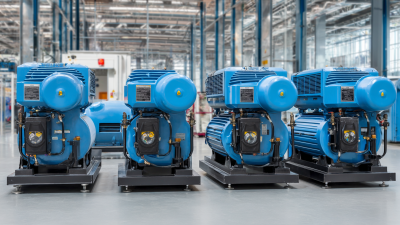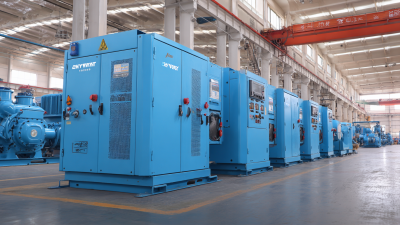Unlocking the Power of Air Compressors: A Comprehensive Guide to Their Applications and Benefits
Air compressors are vital components across various industries, serving as the backbone of numerous applications that drive efficiency and productivity. According to the latest report from the International Air Compressor Association, the global air compressor market was valued at approximately $30 billion in 2021 and is projected to reach over $40 billion by 2028, reflecting a compound annual growth rate (CAGR) of about 5.2%. This growth underscores the increasing reliance on air compressors in sectors such as manufacturing, construction, and automotive, where they are used for everything from powering pneumatic tools to improving energy efficiency in processes. Understanding the myriad applications and benefits of air compressors not only enhances operational effectiveness but also fosters innovation in equipment design and utilization. As we delve into this comprehensive guide, we'll explore how harnessing the power of air compressors can unlock significant advantages for businesses and industries alike.

Understanding the Basics: What is an Air Compressor and How Does it Work?
An air compressor is a powerful device that transforms power into potential energy stored in pressurized air. It operates by drawing in ambient air, compressing it, and then releasing it at a higher pressure. This basic principle underlies a wide range of applications, from industrial processes to everyday tasks. According to a report by the International Society of Automation, air compressors account for approximately 10% of industrial electric consumption globally, highlighting their significance in energy utilization.
Tips: When selecting an air compressor, consider the application and required pressure output. For instance, a portable compressor is ideal for small DIY projects, while a larger, stationary unit may be necessary for heavy-duty industrial applications.
Air compressors come in various forms, such as reciprocating, rotary screw, and diaphragm types, each serving different functions. Reciprocating compressors are popular for their ability to provide high pressures, making them suitable for tasks like powering pneumatic tools. In contrast, rotary screw compressors are more efficient for continuous operation in manufacturing settings. According to the Compressed Air and Gas Institute, properly maintained air compressors can significantly reduce energy costs by up to 30%, underscoring the importance of regular maintenance for optimum performance.
Tips: Regular maintenance, including filter changes and lubrication, can prolong the life of your compressor and enhance its efficiency.
Unlocking the Power of Air Compressors: A Comprehensive Guide to Their Applications and Benefits
| Application | Description | Benefits |
|---|---|---|
| Manufacturing | Air compressors power tools and machinery in various manufacturing processes. | Increases efficiency and reduces downtime. |
| Construction | Used to operate pneumatic tools, such as nail guns and jackhammers. | Enhances productivity and safety on job sites. |
| Automotive | Supplying air to inflate tires and operate various machinery in auto repair. | Speeds up service time and improves accuracy. |
| Painting | Used to power spray guns for applying paint or coatings. | Provides a smooth, even finish while reducing waste. |
| HVAC | Compressors are essential in heating, ventilation, and air conditioning systems. | Enhances system efficiency and prolongs service life. |
| Food and Beverage | Used for packaging, processing, and handling food products. | Improves hygiene and maintains product quality. |
Key Applications: Industries that Benefit from Air Compressors
Air compressors play a pivotal role across various industries, serving as essential tools for a range of applications. In the manufacturing sector, for instance, air compressors are crucial for powering pneumatic tools, which are used in assembly lines and material handling. According to market research reports, the global air compressor market is projected to reach approximately $40 billion by 2025, with significant contributions from the automotive, aerospace, and construction industries. These sectors rely on air compressors not only for efficiency but also for improving productivity and reducing operational costs.
Another significant application of air compressors can be found in the food and beverage industry, where they are instrumental in processes such as packaging, mixing, and bottling. The reliability and cleanliness of air compressors make them a preferred choice for maintaining hygiene standards required in food production. Reports indicate that energy-efficient models are increasingly adopted, leading to enhanced sustainability in manufacturing operations. With the growing emphasis on eco-friendly practices, the demand for advanced, energy-efficient air compressor systems is expected to surge, further boosting their market value in the coming years.
Top 5 Benefits of Using Air Compressors in Everyday Tasks
Air compressors have become essential tools in various industries and everyday tasks due to their efficiency and versatility. One of the key benefits of using air compressors is the significant increase in productivity they provide. According to a report by the International Energy Agency, air compressors account for approximately 10% of the total energy consumption in industrialized countries. This highlights their critical role in streamlining operations, from powering pneumatic tools to facilitating assembly lines.
Moreover, air compressors enhance safety and reduce labor costs. By automating processes and providing a clean energy source for tools, workers can focus on higher-level tasks. According to a survey by the National Institute for Occupational Safety and Health, workplaces that utilize air compressors report a 15% decrease in injury rates, as workers are less exposed to manual lifting and repetitive motions.
 Tip: When selecting an air compressor, consider its CFM (Cubic Feet per Minute) rating to ensure it meets the demands of your specific applications.
Tip: When selecting an air compressor, consider its CFM (Cubic Feet per Minute) rating to ensure it meets the demands of your specific applications.
Another notable benefit is their ability to maintain a clean and dry air supply, crucial for many tasks such as painting and manufacturing. The compressed air acts as a safer alternative to electricity in wet or hazardous environments.
Tip: Regular maintenance, including draining moisture and replacing filters, can prolong the lifespan of your air compressor and ensure optimal performance.
Essential Tips for Choosing the Right Air Compressor for Your Needs
When choosing the right air compressor for your needs, it's essential to understand the various types available and their specific functionalities. Consider the application you'll be using it for—whether that's powering tools in a garage or inflating tires for your vehicle. Different compressors come with various features like portability, tank size, and power source—each influencing their usability in different scenarios. For instance, portable compressors are great for on-the-go tasks, while stationary models may be more suited for heavy-duty applications.

Additionally, pay close attention to the compressor's specifications, such as horsepower, CFM (cubic feet per minute) rating, and maximum pressure. These factors will determine how effectively the compressor can perform its intended tasks. Don't forget to assess the noise levels and ease of maintenance as well, as these can significantly impact your user experience in both residential and professional settings. Investing time in understanding these elements will ensure that you select the best air compressor tailored to your unique requirements.
Maintenance Matters: Best Practices to Extend the Life of Your Air Compressor
To ensure the longevity of your air compressor, regular maintenance is essential. This begins with routine inspections, where you should check for any signs of wear, leaks, or obstructions. Keeping the air filters clean and replacing them as necessary will enhance the efficiency of the compressor, allowing it to operate smoothly and minimize wear on internal components. Additionally, checking the oil levels and changing the oil at recommended intervals can significantly reduce friction and heat buildup, extending the life of the machine.
Another critical aspect of air compressor maintenance is monitoring the pressure settings. Operating the compressor at the correct pressure not only improves its efficiency but also prevents unnecessary strain on the system. Regularly draining condensate from the tank is equally important, as accumulated moisture can lead to corrosion and damage to the compressor. Implementing these best practices will not only increase the lifespan of your air compressor but also ensure consistent performance in its applications, ultimately enhancing productivity and reducing long-term costs.
Related Posts
-

7 Essential Tips for Sourcing High-Efficiency Air Compressors: Maximize Your ROI!
-

7 Essential Tips to Maximize the Efficiency of Air Compressors in Your Operations
-

Choosing Top Quality Manufacturers for Best Industrial Compressors
-

Unlocking Efficiency: The Advantages of Choosing Industrial Compressors for Your Business
-

7 Essential Tips for Choosing the Right Air Compressors for Your Business
-

Global Export Powerhouse Producing the Finest Rotary Screw Air Compressors from China


